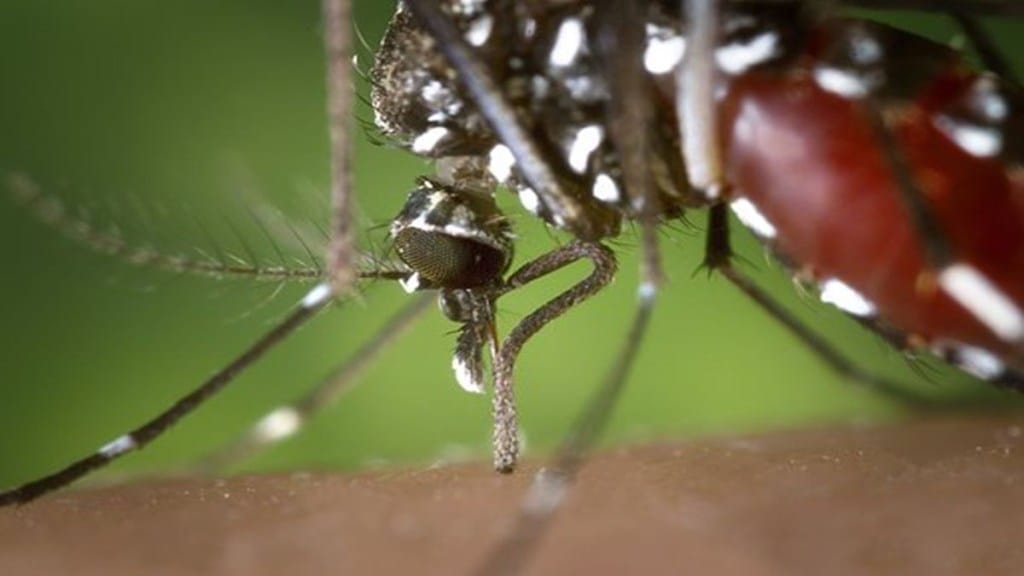Dengue outbreak in India: Amid the surge in dengue cases across India, two cases of an extremely rare form of dengue–Dengue Encephalitis–have been reported in Telangana’s Hyderabad.
According to media reports, the health officials maintain that cases that were reported at a private hospital and could be a result of ‘long covid’ and they are planning to investigate these rare cases. The authorities were reportedly shocked as they hadn’t witnessed this rare form of dengue in recent years.
Out of the two cases, one patient succumbed within hours, and another patient is still under treatment.
“Dengue is a viral infection transmitted by the bite of Aedes Aegypti mosquito and is characterised by flu-like symptoms which include a sudden high grade fever coming in separate waves, pain behind the eyes, muscle, joint and bone pain, severe headache, abdominal fullness, nausea and vomiting and a skin rash with red spots which happens by the 5 th day of illness,” Dr Tushar Tayal, Lead Consultant, Department of Internal Medicine, CK Birla Hospital, Gurugram told Financial Express.com.
What is Dengue Encephalitis?
Dr. Tayal also said that most cases of dengue recover without any complications but some patients may land into Dengue Hemorrhagic Fever. Also, a very rare presentation of dengue is neurological involvement which can lead to Dengue Encephalitis which happens in less than 1 percent of the patients, he said.
“Dengue encephalitis is basically the involvement of the brain parenchyma which can result in symptoms such as disorientation, hallucinations, agitation and changes in behavior, hemiparesis, aphasia in addition to epileptic seizures. Involvement of the brain is due to both direct invasion by the virus as well as antibody-dependent,” he told Financial Express.com.
According to Dr. Tayal, infection of the central nervous system can be confirmed by the presence in serum of IgM antibodies (dengue IgM), viral antigens (NS1), or viruses through the polymerase chain reaction (PCR) technique, where the viral RNA is identified, associated with neurological symptoms.
“Additionally, MRI of brain may reveal in different areas of the brain restriction of diffusion by DWI and foci of hemorrhage in SWI sequence.
According to Dr Vineeta Taneja – Director – Internal Medicine – Fortis Hospital, Shalimar Bagh, dengue encephalitis is a severe neurological complication of dengue fever, a mosquito-borne viral infection. Dengue encephalitis can have complications like Guillain-Barré syndrome (GBS), myosotis, and myelitis.
“It occurs when the dengue virus affects the brain, leading to inflammation and encephalitis. Symptoms include high fever, severe headaches, confusion, seizures, and in some cases, coma,” Dr. Taneja told Financial Express.com.
The exact cause of dengue encephalitis is not fully understood, but it is believed to involve the direct invasion of the virus into the central nervous system, she said.
How is Dengue Encephalitis treated?
Regarding the treatment of dengue encephalitis, there is no specific targeted therapy to date, he said.
“Treatment is primarily symptomatic with the use of antiemetics, anticonvulsants such as benzodiazepines, barbiturates, phenytoin, and corticosteroid pulse therapy (dexamethasone or methylprednisolone),” he added.
According to Dr. Taneja, treatment focuses on supportive care, as there is no specific antiviral medication for dengue encephalitis.
“Patients are typically hospitalized for monitoring and to manage symptoms. Intravenous fluids are administered to prevent dehydration, and pain relievers are given to reduce fever and headaches. In severe cases, patients may require intensive care and supportive measures such as mechanical ventilation,” She told Financial Express.com.
She also emphasised that prevention remains crucial, with efforts directed towards mosquito control and avoiding mosquito bites, especially in dengue-endemic regions.
“Early detection and prompt medical care are vital in managing dengue encephalitis and improving patient outcomes, she added.







